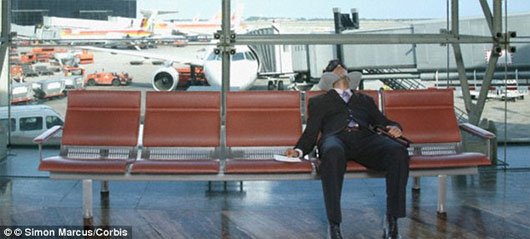The medicine helps to eliminate fatigue due to time zone deviation
Drugs to treat fatigue after a long flight can be sold in the market for five more years thanks to a discovery that can help scientists adjust the biological clock of humans.
Scientists at the University of Manchester (UK) have discovered a mechanism that governs human response to long travel or working outside office hours. Experimental results on mice showed that a human biological clock control enzyme could be adjusted.
The team discovered the gene that produces the enzyme called casein kinase 1epsilon , responsible for controlling the biological clock of mice. They removed this gene from the rat body to prevent them from producing enzymes. After that, scientists tracked how the mouse changed by changing the lighting time in the cage to simulate a flight from England to New York.

Long-term fatigue relief by aircraft can be produced in 5 years
The mice without the eenzyme mentioned above adapt much faster to the new day-night time and show little change in metabolism.
Removing genes cannot be done on humans, but research could allow pharmaceutical companies to study a drug that inhibits enzymes.
'By blocking this enzyme, we can adjust the biological clock late or earlier at our disposal. Fatigue after a long flight can be dissipated by using enzyme inhibitors that control the biological clock, ' said Dr. David Bechtold, head of the study.
Pharmaceutical companies are using this new discovery to develop a drug that reduces the effects of sleep deprivation and fatigue after a long flight and changes in work schedules and daily activities. Dr David Bechtold said the drug could be produced within 5 or 10 years.
Pfizer Pharmaceutical Group has teamed up with the University of Manchester research team to conduct new drug trials and other companies are thought to be researching to produce similar drugs.
- Eastern time zone deviation causes fatigue longer than the west
- Molecules act on human biological clocks
- 15 tips against fatigue after long flights
- Equipment 'extremely toxic' changes the anti-fatigue biology hour
- Is it time for the world to use a common time zone?
- 7 little facts about time zones
- 7 ways to reduce fatigue after flying
- What is Jet lag and how to avoid jet lag on flight?
- Indonesia unifies the time zone
- Eating chocolate against fatigue
- First time control glass in the world
- How to overcome fatigue after Tet
 Green tea cleans teeth better than mouthwash?
Green tea cleans teeth better than mouthwash? Death kiss: This is why you should not let anyone kiss your baby's lips
Death kiss: This is why you should not let anyone kiss your baby's lips What is salmonellosis?
What is salmonellosis? Caution should be exercised when using aloe vera through eating and drinking
Caution should be exercised when using aloe vera through eating and drinking